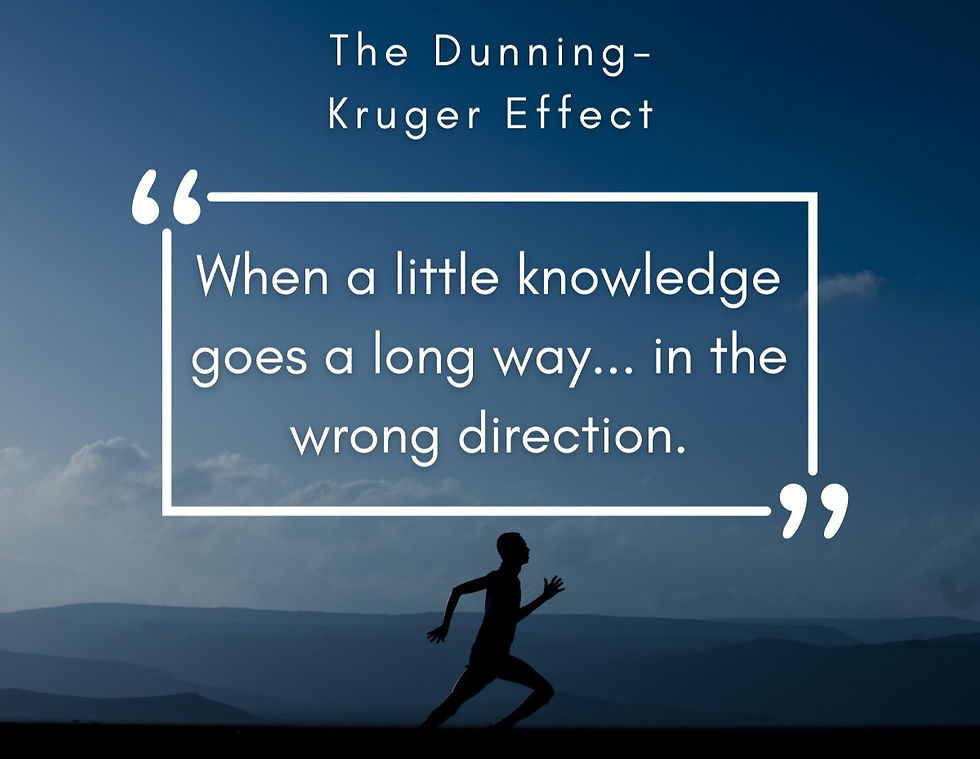
The Dunning-Kruger Effect is a cognitive bias, one in which individuals with low ability/little knowledge in a particular domain tend to overestimate their own competence or knowledge in that domain. In other words, people who lack expertise in a specific area often believe they are more skilled or knowledgeable than they actually are. Simply put, it's when the novice thinks they know more than the expert.
This phenomenon is named after psychologists David Dunning and Justin Kruger. It highlights how our self-perception of confidence and competence can be inaccurate, particularly when we lack the necessary skills or expertise to accurately assess our performance. High-confidence is not necessarily a good indicator of high-competence.
This effect is illustrated, for example, when people with very little knowledge, but armed with a few Google searches, believe they know more about Covid-19 than highly trained experts in immunology and virology. It's also on display when people, equipped with only opinions and superficial knowledge, attack "DEI" efforts, calling them racist. At some point, we all fall prey to this cognitive bias in some informational/behavioral domain. To ward off the the effect of this cognitive bias, be mindful of putting into practice the HERO Skills of Reflection, Humility and Open-mindedness.

Click here provide members with discounts on over-the-counter medications, vitamins, and health essentials, promoting better health management and cost-effective wellness solutions. kaiserotcbenefits.com - more details here
Click here help you find recent death notices, providing information about funeral services, memorials, and tributes for loved ones in your area. obituariesnearme.com - more details here
Click here? Many users have had mixed experiences with the platform, so it's important to read reviews and verify deals before booking. istravelurolegit.com - more details here
Discover the top 10 shoe brands in the UAE with Logo Global. Explore a blend of luxury, comfort, and style, featuring premium collections for every occasion. From trendy casuals to elegant formals, find the perfect footwear to match your lifestyle. Step into sophistication with the finest brands redefining fashion in the UAE.
Discover the latest collection of women shoes in Pakistan at OPIA By LOGO. From stylish heels to comfortable flats, our premium footwear is designed to elevate your look and offer maximum comfort. Shop now for the best variety, quality, and trendy designs that suit every occasion. OPIA By LOGO: Where fashion meets elegance and comfort for women in Pakistan.
IZEL Apparel is a top clothing brand in Pakistan, offering stylish and high-quality outfits for all occasions. From casual wear to formal dresses, our collection has something for everyone. With modern designs and comfortable fabrics, IZEL Apparel helps you look great and feel confident. Shop now and upgrade your wardrobe with trendy fashion that fits your style.
Discover stylish and comfortable men’s shoes designed for every occasion. From classic formal options to trendy casual styles, our collection offers quality, durability, and timeless designs. Perfectly crafted to meet your style needs, our shoes ensure a perfect fit and all-day comfort. Upgrade your footwear with our exclusive range and step confidently into any event. Find the perfect pair with our trusted brand. Shop now and walk in style!